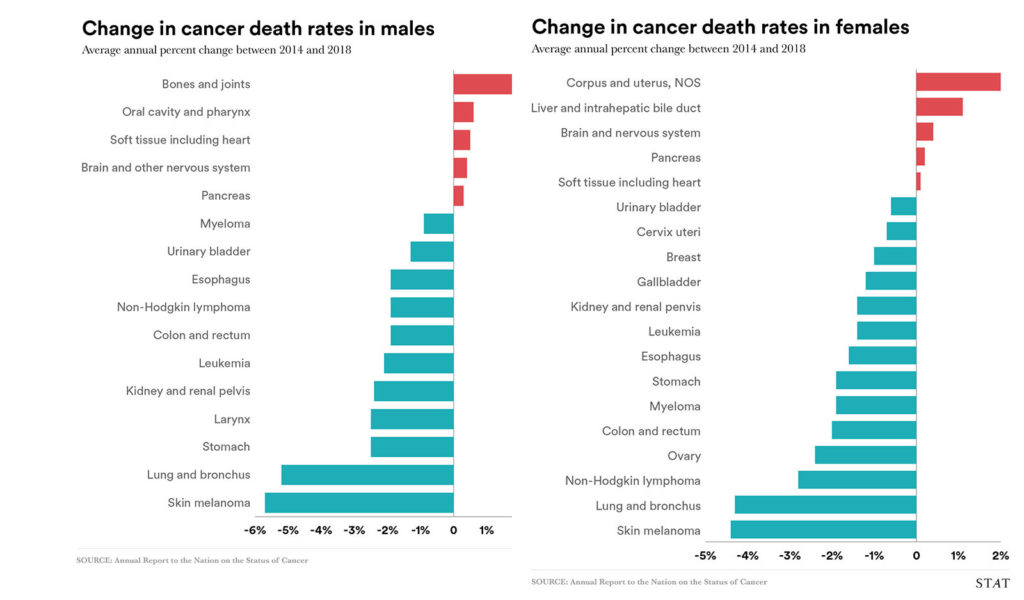Volcanoes are erupting in The Philippines, but on-fire Australia received some welcome rain. The Iran war cries have been called off and The Donald’s military powers are about to be hamstrung by the Senate. Meanwhile, his impeachment trial is starting, and we’re all on Twitter for a front-row seat.
What Could Go Right? Cancer’s big decline
Plus: Asthma attacks plummet, a “holy grail” for diabetics, and more
This is our weekly newsletter, What Could Go Right? Sign up here to receive it in your inbox every Thursday at 6am ET. You can read past issues here.
When was the last time you were excited to read an article about colonoscopies? Right, never. Except for this: now that more people are getting them—the number of people who go for a colonoscopy regularly has tripled since 2000—death rates from colon cancer have declined. In fact, death rates are declining for more than half of common cancers in the United States. The exact numbers are lower death rates for 11 out of the 19 most common cancers among men, and 14 of the 20 for women. Other everyday behaviors like lower smoking rates are a contributing factor, as well as innovative new treatments for cancers such as melanoma.

Crunching the numbers on what went right is not done nearly as much as its opposite, although it’s an important part of policy assessment and, we would say, public sentiment. A study released last week estimated that the rapid vaccine rollout in the US saved almost 300,000 lives and prevented 1.25 million hospitalizations as well as a possible second COVID wave in the spring that could have seen 4,500 deaths per day. (Measuring the benefits of catastrophe averted was one topic of a March conversation between our founder, Zachary Karabell, and TPN Member R. P. Eddy, the architect of the first-ever White House pandemic response plan.)
It’s with those concrete numbers in mind that we turn, again, to the worldwide vaccination effort. The faster we go, the fewer lives at risk. Fears about the Delta variant have reinvigorated vaccination efforts in many European countries, which is especially welcome news paired with the World Health Organization announcement that the majority of Delta cases in fully vaccinated people are mild or asymptomatic. Taiwan has been trying for months to buy more vaccines but says China has been blocking the deal. But two Taiwainese tech companies have gotten around whatever the challenges were, buying 5 million doses each that they will donate to the government for distribution. And we were inspired this week once more by a snapshot of the incredible humans carrying out the on-the-ground vaccination work:
Restrictions are set to lift in Britain next Monday now that 87% of adults have received at least one vaccine dose. Britain is unusual in that it has followed a “first doses first” strategy, delaying second doses in order to vaccinate as many people as possible as quickly as possible. It’s a sound strategy, TPN Member Alex Tabarrok has been saying for months, given the high efficacy of the first dose. Now we’re keen to follow the latest news that two “mini-doses” of the Moderna vaccine—just a quarter of what’s currently in the standard dose—are all that’s needed to produce an immune response. Mini-doses could massively speed up efforts in the global south and elsewhere. “There’s a huge status quo bias, and it’s killing people,” Tabarrok told Nature. “Had we done this starting in January, we could have vaccinated tens, perhaps hundreds, of millions more people.”
Despite all the nervousness around asthmatics and COVID-19 infections, “Pediatric ICUs have sat strangely empty,” wrote Sarah Zhang in The Atlantic for an article about how asthma attacks have plummeted during the pandemic. Doctors and scientists don’t yet know why but are trying to puzzle it out. One theory is that common viruses like colds have a much greater effect on asthma than they previously thought.
For our philosophically-inclined readers, this week we’re recommending an article from Roots of Progress website author Jason Crawford as well as an article from TPN Member Yascha Mounk’s online publication Persuasion. Presented with the false choice between optimism and pessimism, why not choose the third way of solutionism? (The first two paragraphs are almost like a who’s who of TPN Members.) And, why we shouldn’t be so quick to criticize the media about correcting their lab-leak theory coverage.
Before we go, your weekly dose of “sometimes the good guys win”:a controversial oil pipeline that would have run through Black neighborhoods in Tennessee has been officially canceled. We would be remiss, though, not to connect the dots between the mention in this article of the high cancer rates in these Tennessean neighborhoods with the fact that Black men and women have higher mortality rates from cancer in the US generally, despite lower incidence. The first article we linked to in this newsletter has further information.
And your dose of “man, science is cool”: Australian researchers have reached the “holy grail” for diabetics, a blood-sugar test that uses saliva rather than a needle jab.
Below in the links section, finally, a plant-based chicken that actually tastes like chicken, a biodegradable pregnancy test, and more.
Economist Mark J. Perry shares World Bank data showing an impressive 80.5% drop in world poverty from 1981 to 2019.
From us: Millions of American families will start receiving monthly payments of up to $300 per child today via the expansion of the Child Tax Credit. The expansion could significantly reduce child poverty in the US, maybe even by half. We wrote more about the temporary expansion of the tax credit, and the push to make it permanent, in April. Get a quick refresher with Progress in Five Minutes: Slashing Child Poverty in Half.
Progress, Please
(Found good news? Tweet at us @progressntwrk or email.)
Other good stuff in the news
United States:
- Grandmother-approved chickenless chicken has arrived | Vox
- United Airlines will buy up to 100 small electric planes | Chicago Tribune
International:
- The EU approved an $800 billion COVID recovery plan | DW
- COVID breathalyzers? Dutch scientists are working on it | The New York Times
- The first flushable pregnancy test is here—and it’s completely biodegradable | Byrdie
- Moderna started human trials of an mRNA-based flu shot | The Verge
- Israel’s Supreme Court approved surrogacy rights for same-sex couples | The Times of Israel
- Pakistan opened a state-run school for transgender students | AP
TPN Member originals
- The story of a local journalism revival in the sparsely populated farmland of eastern South Dakota | James Fallows
- TPN Member Adam Grant reimagines work after COVID | Ian Bremmer
- Is China’s Didi crackdown any different from recent US moves against Big Tech? | Zachary Karabell
- In conversation with Counterweight’s Helen Pluckrose on Critical Social Justice and what people can do to push back | Steven Pinker
- Is Haiti governable right now? | Tyler Cowen
- The surprising importance of to-go cocktails | Jason Feifer
- How to prepare for the AI productivity boom | Erik Brynjolfsson
- Why global emissions grew much more slowly over the past decade | The Breakthrough Institute (Zeke Hausfather)
Upcoming Events
Friday Fireside Chat with David Bornstein | Rita McGrath | July 16
Why Mobility Is Destiny | Parag Khanna | October 13
New Member Alert

A big welcome to our latest Member, Rita McGrath! Rita is a best-selling author, a sought-after advisor and speaker, and a longtime professor at Columbia Business School. She is one of the world’s top experts on strategy and innovation and is consistently ranked among the top ten management thinkers in the world. Rita’s latest book on strategic inflection points is Seeing Around Corners: How to Spot Inflection Points in Business Before They Happen. She is also the author of four other books, including the best-selling The End of Competitive Advantage.
Listen to Rita speak about strategies for getting ahead of inflection points.
Violence, More or Less
If you’re an American reader, you know there has been no shortage of articles about the increasing murder rate in US cities. It may be one reason why, in a new USA Today and Ipsos US poll, 57% of Americans say there is more violent crime now in the US than 30 years ago. Here’s—as ABC’s Director of Data Journalism, John Kelly wrote—the truth:
As for the murder surge, it’s still trending upward, but showing signs of decelerating. Here’s data analyst Jeff Asher from last summer on why murder rates are up but other violent crime is down, and what we can do about it.
On Our Bookshelf

From the time TPN Member Courtney E. Martin strapped her daughter, Maya, to her chest for long walks, she was curious about Emerson Elementary, a public school down the street from her Oakland home. She learned that White families in their gentrifying neighborhood largely avoided the majority Black, poorly rated school. As she began asking why, a journey of a thousand moral miles began.
Learning in Public is the story of not just Courtney’s journey, but a whole country’s. Many of us are newly awakened to the continuing racial injustice all around us, but unsure of how to go beyond hashtags and yard signs to be a part of transforming the country. Courtney discovers that her public school, the foundation of our fragile democracy, is a powerful place to dig deeper.
Learn more about the book and pre-order it here.
Until Next Time
What do you call skydiving when you don’t use a parachute and you’re a fish? No, really. We’re actually asking.


